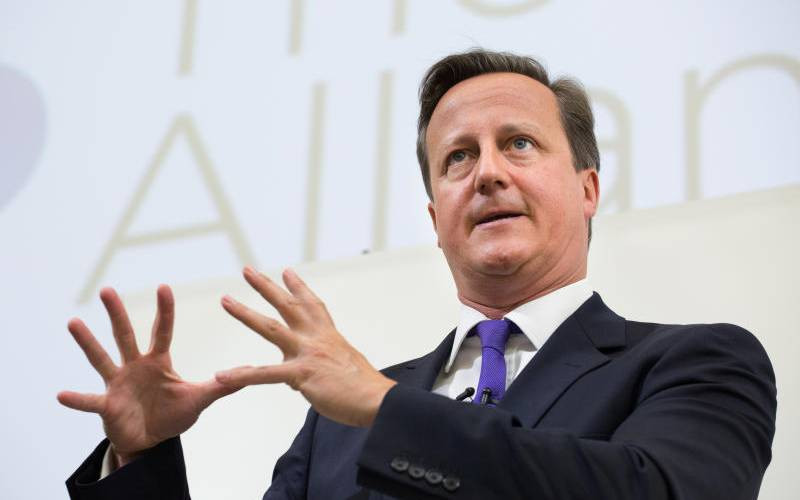By the time you read this, there is the possibility Britain shall have gone into labour to deliver her latest member of the Commonwealth in, to use British Premier David Cameron‘s preferred coinage, 'the family of nations'.
It‘s a development that Mr Cameron can hardly countenance; he‘s been teary since the referendum to decide Scotland‘s future entered the home stretch; although the campaign has been running for the past two years non-stop.
But Cameron's is a last-minute struggle, as he waited until it was too late to make his impassioned plea, which is not likely to count for anything in yesterday‘s referendum. What‘s remarkable is how our former colonial master is behaving when confronted with the challenge of having a part of her own territory torn.
If you don‘t like me, Cameron pleaded in a breaking voice, I can live with that. I won‘t be in power forever, but if you are gone, you will be gone forever...
Cameron‘s tears were not crocodile 'tears' but genuine loss of what it would mean for his country‘s future without Scotland. Why, 90 per cent of British oil comes from Scotland. It would also mean losing 32 per cent of Britain‘s territory.
Cameron offered what sounded like a Kenyan prescription: his Government offered to devolve more powers and privileges to Scottish Parliament in what we call nusu mkate (half-loaf) democracy.
I am not sure if this power-sharing with Scotland will entail pesa mashinani, (money for the grassroots).
On the contrary, our former colonial master has been less enthusiastic about keeping Africa intact. As a matter of fact, Britain have rushed with alacrity to carve up new nations wherever there are signs of strife in Africa.
You saw them in South Sudan in 2005, when the America-funded referendum decreed the creation of Africa‘s 54th nation, even when it was evident that the new nation‘s economic and political viability was hardly feasible.
And we saw them in the Horn of Africa where Eritrea was hived off Ethiopia after a tooth-and-nail battle that cost many lives and years of underdevelopment.
And the Brits had no qualms about the balkanisation of this country into 47 counties in yet another experiment, after the power-sharing deal that preceded it.
Freedom for Scotland will mean they can choose how to utilise their resources for the betterment of the Scottish people, who have been dominated by the English for the past 300 years.
Their language, Gaelic, would enjoy a rebirth, as would their unique dressing, kilt, and their traditional music comprising bagpipes and fiddles.
Obviously, there will be local implications in Scotland‘s push for autonomy. Thogoto, named after the Church of Scotland mission that pitched tent deep in the heart of Kikuyuland a century ago, would have a chance to review whether to keep its old name or adopt a new one.
And footie lovers, especially those that support Celtic, will have to find new teams in the English premiership if the political decision impacts the way future leagues are organised.
Stay informed. Subscribe to our newsletter
And although Cameron insists he will not resign if Scotland breaks free, his leadership would be untenable if one-third of his country secedes.
If that were to happen, Cameron‘s prophesy would come to pass: the Great Britain would never be the same again without Scotland.
What‘s surprising is how this simple truism escaped the English for such a long time; any country that mutates to create a new nation, of course, can never be the same again. The sun is finally setting on the Empire.
 The Standard Group Plc is a
multi-media organization with investments in media platforms spanning newspaper
print operations, television, radio broadcasting, digital and online services. The
Standard Group is recognized as a leading multi-media house in Kenya with a key
influence in matters of national and international interest.
The Standard Group Plc is a
multi-media organization with investments in media platforms spanning newspaper
print operations, television, radio broadcasting, digital and online services. The
Standard Group is recognized as a leading multi-media house in Kenya with a key
influence in matters of national and international interest.
 The Standard Group Plc is a
multi-media organization with investments in media platforms spanning newspaper
print operations, television, radio broadcasting, digital and online services. The
Standard Group is recognized as a leading multi-media house in Kenya with a key
influence in matters of national and international interest.
The Standard Group Plc is a
multi-media organization with investments in media platforms spanning newspaper
print operations, television, radio broadcasting, digital and online services. The
Standard Group is recognized as a leading multi-media house in Kenya with a key
influence in matters of national and international interest.






